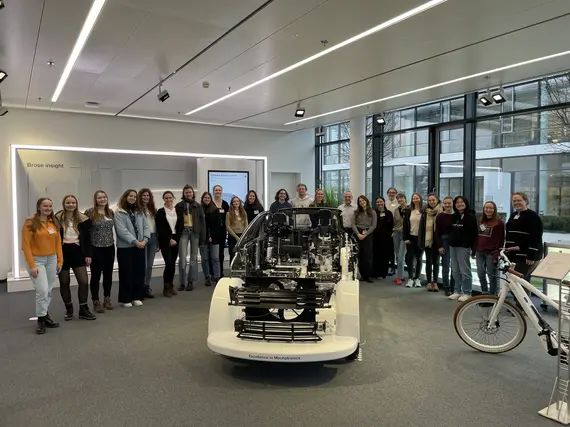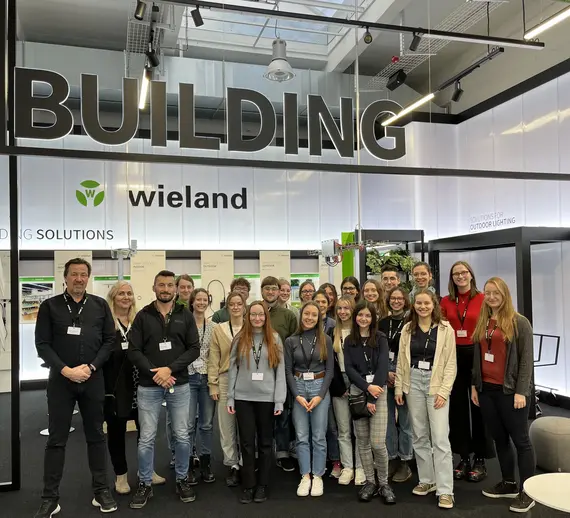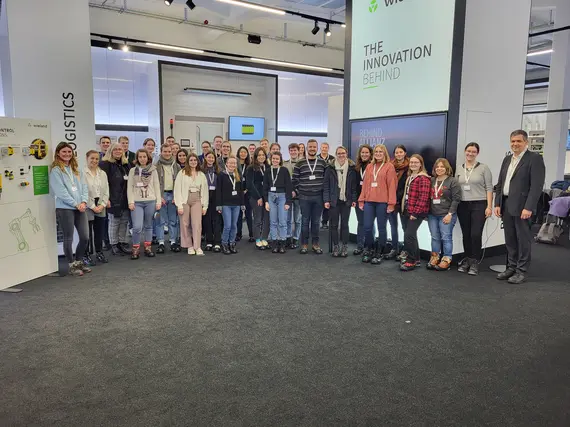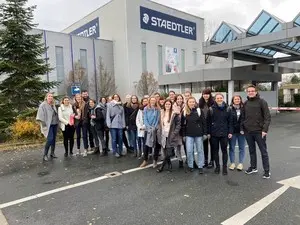Excursions and Practical Talks
Work and organizational psychology is an applied subject. In practice, work and organizational psychologists primarily focus on fields of work related to personnel. Consequently, topics such as personnel and career development, the recruitment and selection of employees or performance assessments are at the forefront of our work. To offer students the opportunity to practically explore the broad fields of activity in work and organizational psychology , the Professorship of Work and Organizational Psychology regularly organizes national business field trips and practical lectures. The interlinking of science and practice is key to our work.

WS2024/2025
Excursion to Brose in Bamberg
In December 2024, the students from the lecture “Work and Organizational Psychology” once again had the chance to visit a regional industrial company: A perfect opportunity to expand their theoretical knowledge with practical insights! This year we went to Brose, an automotive supplier with locations across Germany, Europe, and the whole world. On 5th of December 2024, all those interested met at Brose in Bamberg to learn more about the company.
Mrs. Rehaber welcomed us and guided us to the presentation room of the “social building”, where she gave us an overview of the company. In doing so, she briefly outlined the company’s history and emphasized the various production and development areas, the company locations, and the numerous customers.
Afterwards we received a tour of the company site in two groups, each led by two trainees. This gave us the unique chance to gain an insight into the daily work routine and working methods at Brose. The interactive nature of the tour and the opportunity to ask questions made this part of our excursion particularly exciting.
Finally, Mr. Furtwängler offered us an introduction to the work of HR development in general and at Brose in particular. He used various examples to illustrate how the company creates opportunities for lifelong learning and supports the further development of its employees. Mr. Furtwängler involved the students in his presentation, readily answered all questions, and discussed current challenges in HR development with them. The excursion participants were thus able to gain concrete insights into an area of application of work and organizational psychology.
Our sincere thanks go to Mrs. Rehaber for organizing this excursion and making it possible. We would also like to thank Mr. Furtwängler and the trainees for the tour of the company and for the insights into everyday working life at Brose.

WS2023/2024
Practical insights at Wieland Electric
As in the previous year, in January 2024 we visited the headquarters of Wieland Electric GmbH in Bamberg, a leading company in the field of Building Solutions and Industry Solutions, with students from the lecture "Work and Organizational Psychology".
Ms. Lang welcomed us together with other employees in the interactive showroom. The excursion started with a presentation on the company's origins, guidelines and future plans, which emphasized the company's intention to focus more strongly on personnel selection and development. This content was linked to the topics covered in the lecture, so that the students were able to ask specific questions, which were gladly answered. We were also informed about the initiatives taken by Wieland to promote the mental and physical health of their employees.
This was followed by a tour of Wieland's production facilities, which illustrated the development and use of pluggable electrical installations and provided insights into the work processes. We were also guided through the vivid presentations of the products in the showroom. For instance, we learned about the possible uses of electrical installations, connection technology and safety technology, which we often encounter in everyday life, e.g. in offices.
At the end, we had the opportunity to talk to Wieland employees and ask further questions in a relaxed atmosphere over snacks and drinks. This was a successful conclusion and left us with fond memories.
Our sincere thanks go to Ms. Lang for organizing this excursion and giving us the opportunity to do it again. We would also like to thank the employees of Wieland Electric, both for the guided tour of the plant and for the insights into their everyday working life.

WS2022/2023
Excursion to Wieland Electric
When travelling to Bamberg by train, it is virtually impossible not to notice Wieland Electric GmbH. Directly opposite the train station, one can see the company grounds—who would guess that situated here is a world-leading brand? We wanted to look at more closely, so in January 2023 around 35 students and members of the Professorship of Work and Organizational Psychology visited Wieland's headquarters.
After everyone was equipped with steel-capped shoes—in accordance with the motto "Safety First"—, Frau Lang and other colleagues welcomed us into an interactive showroom. At first the company was presented to us as a pioneer in safe electrical connectivity solutionsand in the field of pluggable electrical installation for functional buildings. Subsequently the HR department presented the various work environments of its employees—both in production as well as the office and went into their respective details. We were also informed about the policies offered by Wieland to employees to support their mental health.
For the next point of the programme we were divided into small groups and led through production, office spaces and the showroom. Here we comprehensively learned what is concealed behind the terms "electronic connectivity solutions" and "pluggable electrical installation for functional buildings", how these arise step by step and what for the diverse potential applications exist, as well as where in our everyday life we might encounter them.
Subsequently we were even able to talk casually, supplied with snacks and drinks, to the employees of Wieland, whom we plied with questions. Whoever wished also had the chance to become personally active in the handiwork and solder flashlights to a keychain—a felicitous conclusion and a nice keepsake.
We would like to thank Frau Lang for organising the excursion. We would also like to thank the employees at Wieland Electric: the tour through the factory, the insight into everyday life and that they answered all our questions so openly.
WS2019/2020

Excursion to STAEDTLER Mars GmbH & Co. KG in Nuremberg
On 28th November 2019 the Professorship of Work and Organizational Psychology, together with students in the conjunction with lectures on "work psychology", made an excursion to the headquarters of STAEDTLER in Nuremberg. The students received in-depth insights into production and work processes of a middle-sized industrial company. STAEDTLER employs around 2,200 workers and is Europe's largest producer of pencils and coloured crayons.
At the beginning of the excursion, we received a short introduction to the company's history and the industrial production of the diverse product range of wooden pencils, highlighters and fineliners. Subsequently we untertook a factory tour, in which we visited the workspaces and inside the production line. On a tour over the entire factory premises we were able to follow in detail the partly automated work-processes of procurement and productoin until the shipment of orders. On the basis of activity analysis, we discussed the relevant aspects of the work (such as the difficulty of tasks, work demands and conditions, as well as the social and psychological environment of the workplaces), in the course of which new ideas arose for practical intervention opportunities with respect to ergonomic office planning and support of psychological stress factors in during work in production.
We are very grateful to Mr. Rüdel, who led us through the production areas and gave his entire morning to answering our questions.
